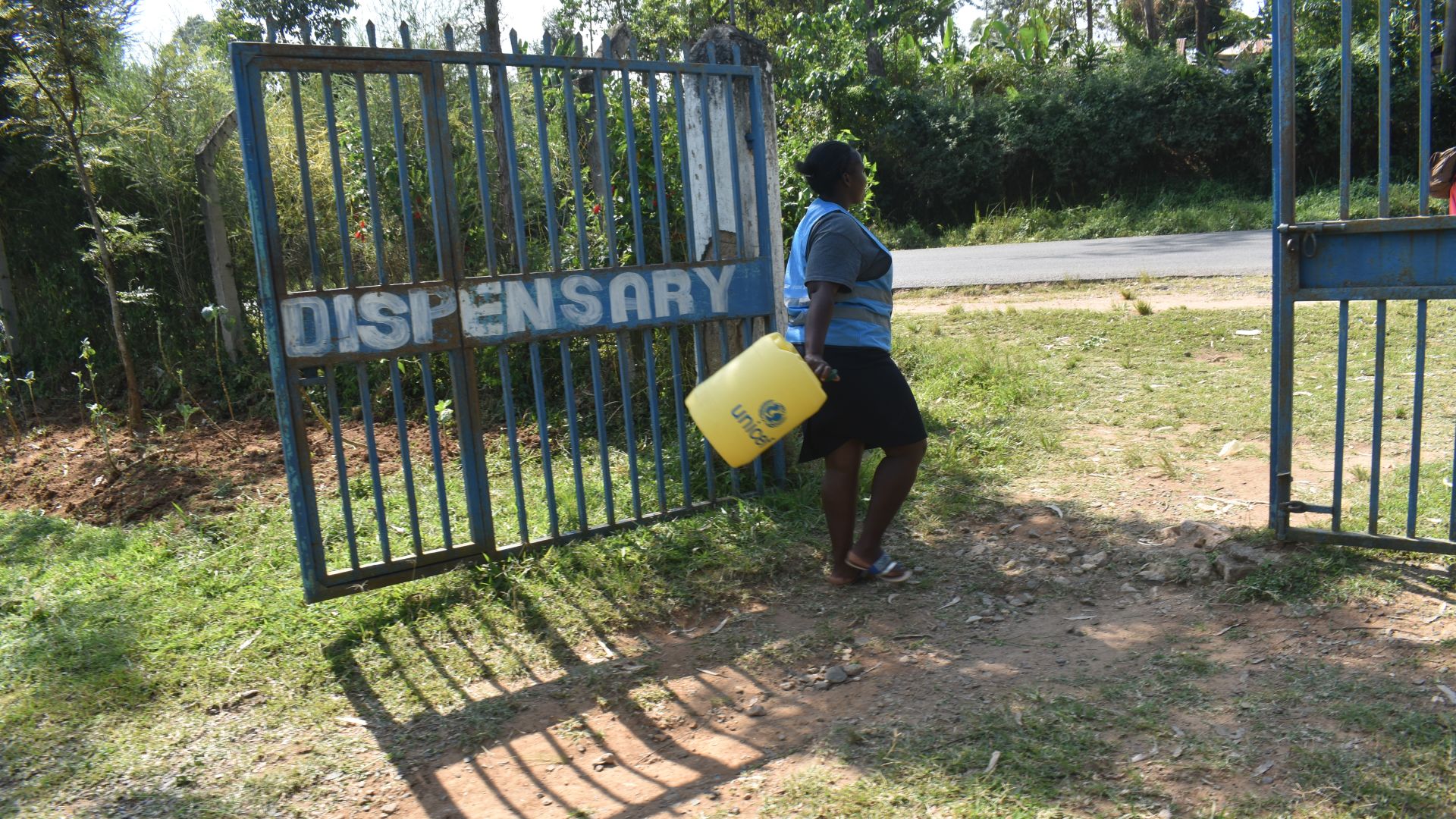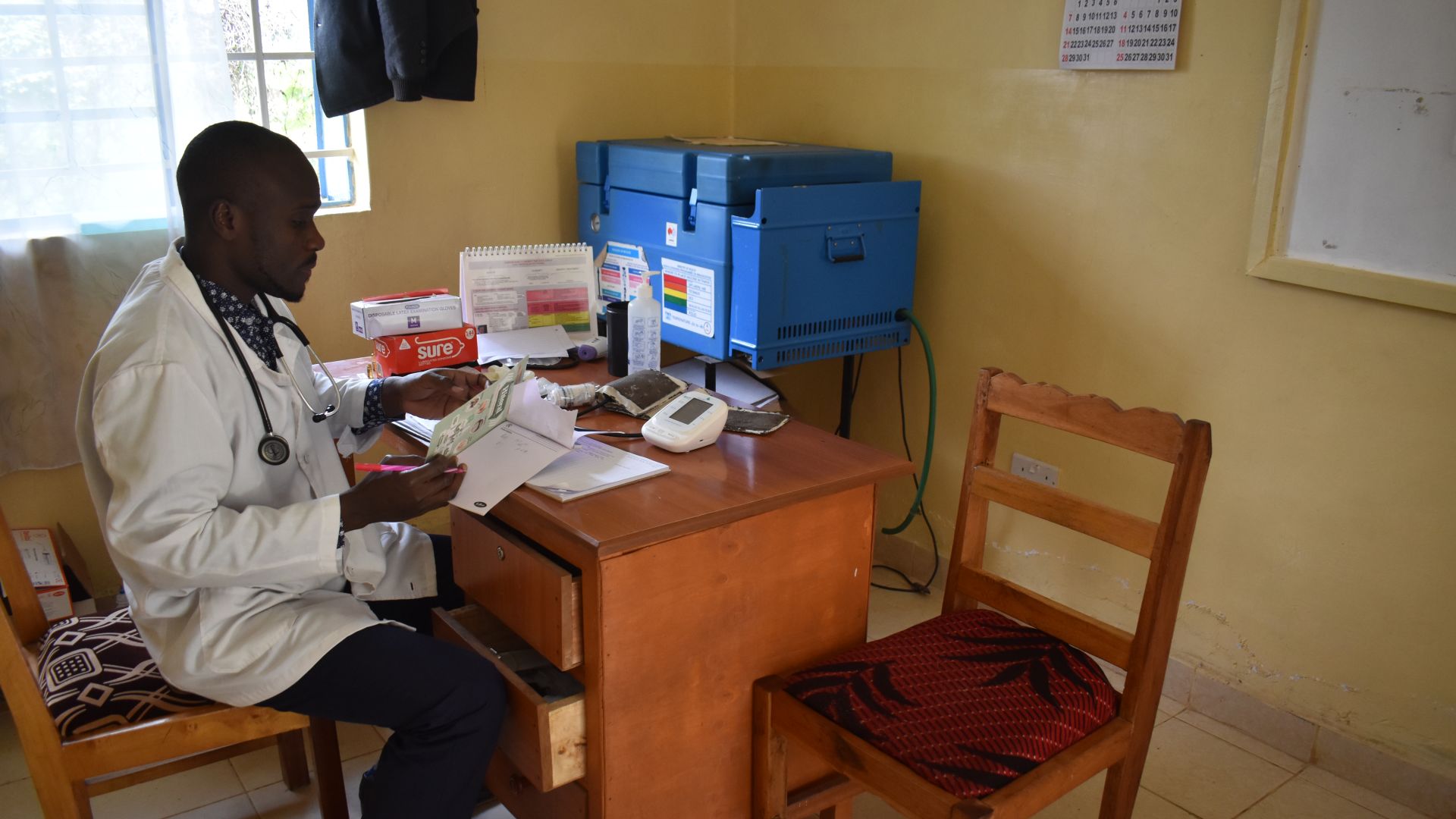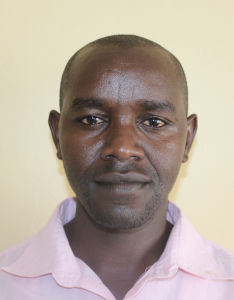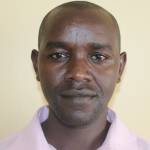The Jebrock Dispensary, staffed by six dedicated healthcare workers, provides vital medical services to an average of 80 patients each day from the surrounding community. However, delivering quality care is increasingly difficult without reliable access to safe water.
Instead of focusing fully on patient care, staff are forced to spend valuable time and energy fetching water.

A staff member leaves the health center to collect water from the community spring.
Currently, they rely on two inadequate, unsustainable water sources: a small rainwater collection tank at the clinic that dries up quickly, and a partially protected community spring located nearly an hour away.

A clinic staff member, after the exhausting trip to the community spring, collects water to haul back to the center.
Worst of all, the spring water is sometimes contaminated, causing further health issues, such as typhoid. Sadly, those coming to the health center looking for help are unintentionally being harmed, but without another solution, everyone is at the mercy of the only water they have available.

Carrying water back to the health center.
Nicholas Esevwe, a 33-year-old clinical officer at the health center, is sadly all too familiar with suffering from water-related illnesses.
"It is so sad to see my patients suffering from water that is meant to bring health to them, but instead leads to diseases and in [the] extreme, loss of life, when the effects are too adverse and beyond treatment," Mr. Esevwe lamented.

Mr. Esevwe at work.
But it's not just the patients who suffer—staff members are also affected by the contaminated water, as they have no choice but to use it.
"As a medical practitioner, my responsibilities are to provide medical care to patients who need treatment for [the] diseases they are suffering from, and be able to set them free from pain. As a result of being affected by water-related illnesses, I miss reporting to work because I cannot carry out my duties as usual due to general weakness in my body," he continued.

All those involved at Jebrock Dispensary need a solution to their water crisis. Without it, the staff's ability to provide appropriate medical care will be limited, and everyone's health will remain at risk. Access to a nearby, safe water source is the only thing that will prevent the impacts from continuing to be devastating.
Steps Toward a Solution
For health care settings, immediate access to a large quantity of clean water is crucial for handwashing, sterilization of equipment, cleaning, and safe childbirth. Water that is off-site creates delays, impacts patient care, and increases the risk of hospital-acquired infections.
Our coverage goals aim for all health centers to have an on-premises water source that will sufficiently serve the patients, healthcare providers, and staff to ensure accessibility, reliability, and safety. With more water available, healthcare workers do not have to ration water, worry about purchasing water with their limited funds, or make tough decisions about when to wash their hands or equipment.
Reliable, clean water ensures that healthcare workers have sufficient water so they can provide excellent patient care!
Our technical experts worked with the health center leadership and the local community to identify the most effective solution to their water crisis. They decided to drill a borehole well, construct a platform for the well, and attach a hand pump.
Well
Abundant water often lies just beneath our feet. Aquifers—natural underground rivers—flow through layers of sediment and rock, offering a constant supply of safe water. A borehole well is drilled deep into the earth to access this naturally filtered and protected water. We penetrate meters, sometimes even hundreds of meters, of soil, silt, rock, and more to reach the water underground. Once found, we construct a platform for the well and attach a hand pump. The community gains a safe, enclosed water source capable of providing approximately five gallons of water per minute. Learn more here!
Handwashing Stations
Alongside each water source, we install two gravity-fed handwashing stations, enabling everyone at the health center to wash their hands. Handwashing is crucial for preventing water-related illnesses within the health center and community. Health center staff will maintain the stations, fill them with water, and supply them with soap, which we often teach them how to make.
Latrines
We ensure there are Ventilated Improved Pit (VIP) latrine blocks that effectively prevent the transmission of fecal diseases. Each latrine will boast a durable cement floor for easy use and maintenance. We’ll ensure at least one stall is reserved for staff, along with gender-separated toilets that include menstrual hygiene facilities and accessible options for individuals with limited mobility.
Health Care Staff and Community Education & Ownership
Hygiene and sanitation training are integral to our water projects. Training is tailored to each community's specific needs and includes key topics such as proper water handling, improved hygiene practices, disease transmission prevention, and care of the new water point. Safe water and improved hygiene habits foster a healthier future for everyone in the community.
Encouraged and supported by the guidance of our team, a water user committee representative of the community's diverse members assumes responsibility for maintaining the water point, often gathering fees to ensure its upkeep.

 Borehole Well and Hand Pump
Borehole Well and Hand Pump
 Rehabilitation Project
Rehabilitation Project




















